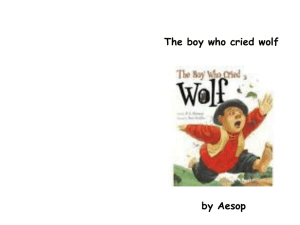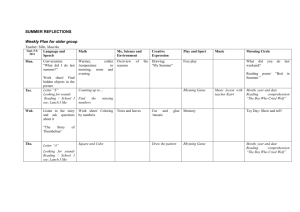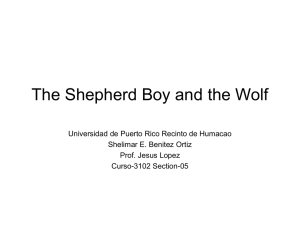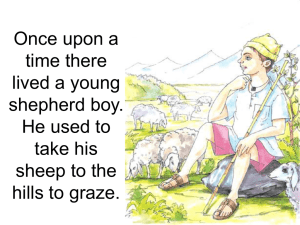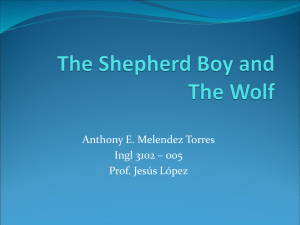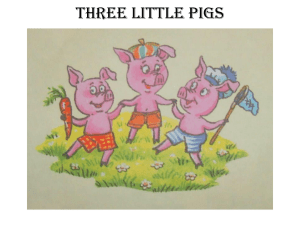File
advertisement
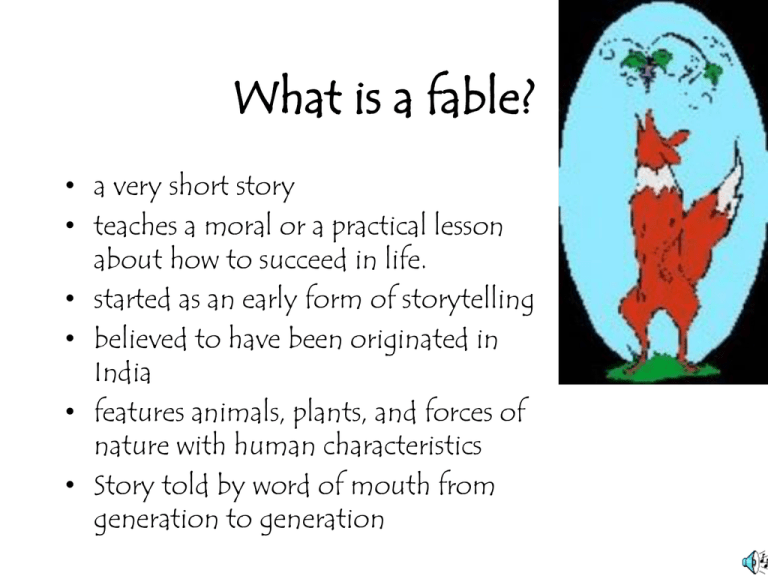
What is a fable? • a very short story • teaches a moral or a practical lesson about how to succeed in life. • started as an early form of storytelling • believed to have been originated in India • features animals, plants, and forces of nature with human characteristics • Story told by word of mouth from generation to generation Who was Aesop? Aesop… • a Greek slave • a Greek story teller • His stories were all oral and passed from generation to generation by word of mouth • He was a keen observer of both animals and people. • Very little was know about his life since records were not kept this early • born – died : 620-660 The Tortoise and the Hare http://www.umass.edu/aesop/fable.php?n=16 Think deeply about the text: • What was the problem in this fable? • What was the solution in this fable? • What was the moral or life lesson learned? “The Tortoise and the Hare” The Characters: The Tortoise The Hare The Problem: The tortoise and the hare are racing, but hare is much faster. The Solution: The hare gets tired & stops for a nap. The tortoise just keeps moving along, and wins the race. The Moral: Slow and steady wins the race. The Boy Who Cried Wolf An Aesop Fable There once was a boy who kept watch over the village sheep. He would often become bored and to amuse himself he would call out, "Wolf! Wolf," although there was no wolf about. The villagers would stop what they were doing and run to save the sheep from the wolf's jaw. Once they arrived at the pasture, the boy just laughed. The naughty boy played this joke over and over until the villagers grew tired of him. One day while the boy was watching the sheep, an actual wolf did come into the field. The boy cried and cried, "Wolf! Wolf!" No one came. The wolf had a feast of sheep that day. And the moral is… • No one will believe a habitual (constant) liar even when he is telling the truth. Responding to Reading: We respond to reading similarly to how we writing about our math problem solving. 1) Restate the question 2) Give evidence/text examples 3) Write a concluding sentence that “disguises” your opinion with “it seems” and adds your voice as well! Why did the boy “cry wolf” when it was untrue? (Restate the question) The boy cried wolf while watching the sheep. (Evidence) For example, he cried wolf because he was bored and wanted to amuse himself while watching the sheep. He wanted attention from the villagers. (Concluding sentence) Therefore, it seems like the boy cried wolf just for his own entertainment. What is the moral of The Boy Who Cried Wolf? (Restate) The moral of The Boy Who Cried Wolf was that people who lie are often not believed nor trusted by others. (Evidence) For example, the villagers didn’t believe the boy’s real cry of wolf since he lied and tricked them a couple of times before. (Concluding sentence) Therefore, it seems like dishonest people will definitely not be trusted. How do you think the villagers felt after the boy tricked them? In your reading binder, write out and answer the question below, using responding to reading format. Why did the villagers ignore the boy’s true cry for help? The Lion and the Mouse Ex Explain why the lion was angry in the beginning of the fable. Explain how the trapped lion felt when he saw the mouse. In your reading binder: How did the mouse help the lion? On an index card: What is the moral of The Lion and the Mouse? (Restate) (Evidence) (Concluding Sentence)
